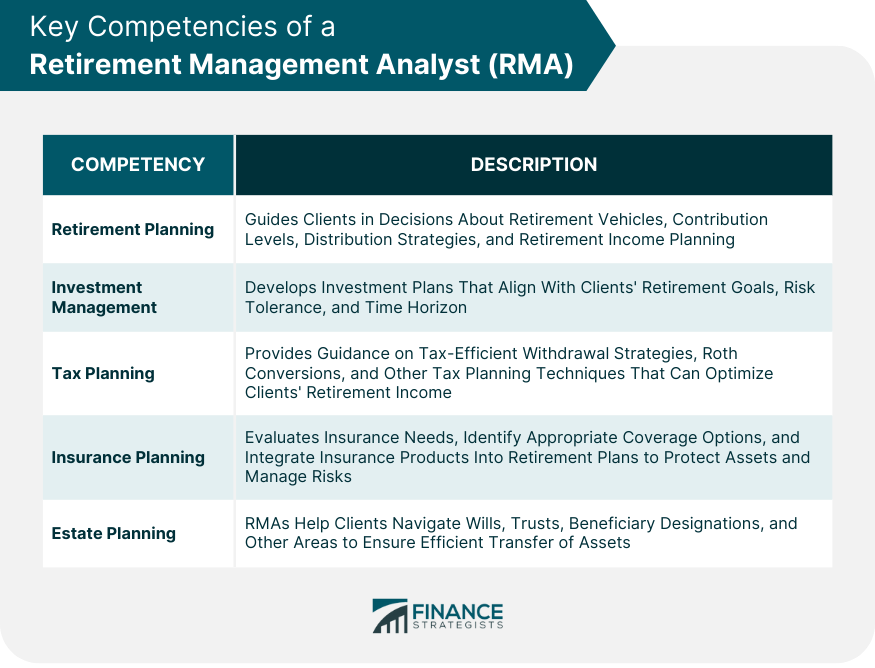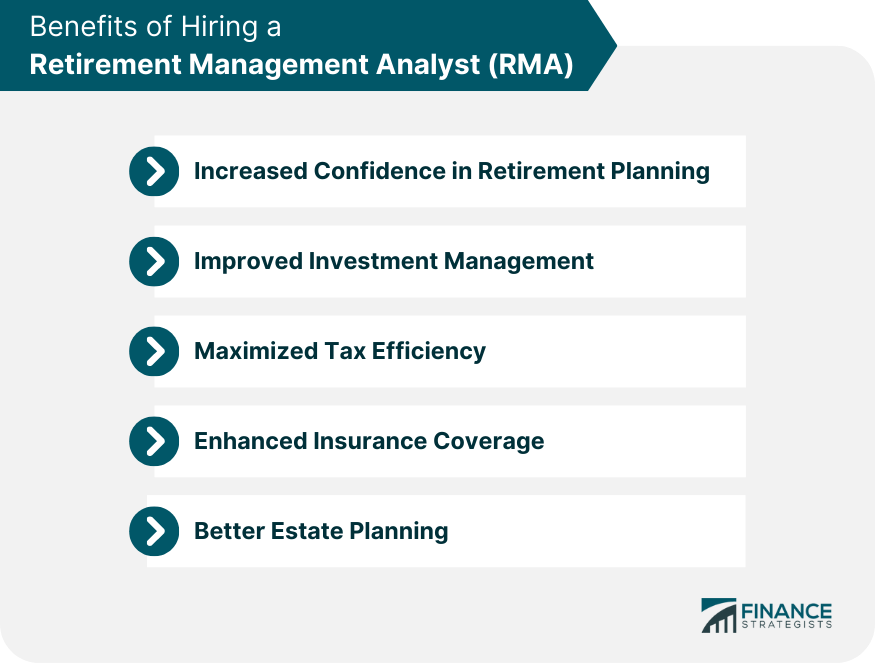A Retirement Management Analyst (RMA) is a financial professional specializing in retirement planning and management. An RMA is trained to provide comprehensive guidance and advice to individuals and families as they navigate the complexities of retirement planning, investment management, tax planning, insurance planning, and estate planning. It is a professional designation offered by the Retirement Income Industry Association (RIIA). It is designed to equip financial professionals with the knowledge and skills necessary to help clients achieve their retirement goals and effectively manage their retirement income. The program covers various aspects of retirement planning, including income planning, risk management, asset allocation, and tax-efficient strategies. The role of an RMA is crucial in today's retirement landscape, where individuals are faced with the challenges of longer life expectancies, changing economic conditions, and complex financial markets. RMAs possess in-depth knowledge on various retirement vehicles, such as individual retirement accounts (IRAs), 401(k) plans, and pensions, and can help individuals make informed decisions about contribution levels, distribution strategies, and retirement income planning. Investment management is a critical competency for an RMA. They are well-versed in asset allocation strategies, portfolio construction, risk management, and the selection of appropriate investment vehicles. RMAs help clients develop investment plans that align with their retirement goals, risk tolerance, and time horizon. Tax planning is a vital component of retirement planning, and RMAs have a thorough understanding of the tax implications associated with different retirement strategies. They can provide guidance on tax-efficient withdrawal strategies, Roth conversions, and other tax planning techniques that can optimize a client's retirement income. Insurance plays a crucial role in protecting retirement assets and managing risks. RMAs have expertise in evaluating insurance needs, including long-term care insurance, life insurance, and annuities. They can help clients identify appropriate coverage options and integrate insurance products into their retirement plans. Estate planning is an essential aspect of retirement planning, and RMAs possess knowledge of estate planning strategies, including wills, trusts, and beneficiary designations. They can collaborate with estate planning attorneys to ensure that a client's assets are transferred efficiently and in accordance with their wishes. By hiring an RMA, individuals gain access to specialized knowledge and expertise in retirement planning. This expertise provides a higher level of confidence and peace of mind, knowing that their retirement goals and financial well-being are in capable hands. RMAs are skilled in investment management and can develop personalized investment strategies that align with an individual's retirement objectives and risk tolerance. They can help clients navigate market volatility, make informed investment decisions, and monitor and adjust investment portfolios as needed. Retirement planning involves complex tax considerations, and RMAs can help individuals optimize their retirement income from a tax perspective. They can provide guidance on tax-efficient withdrawal strategies, take advantage of available tax credits and deductions, and ensure that retirement plans align with individuals' tax situations. RMAs possess expertise in evaluating insurance needs and can help individuals select appropriate coverage options to protect their retirement assets. They can assess the risks associated with retirement and identify insurance products, such as long-term care insurance or annuities, that can provide additional protection and financial stability. Estate planning is a complex and often overlooked aspect of retirement planning. RMAs can collaborate with estate planning attorneys to develop effective estate planning strategies that ensure assets are transferred efficiently and in accordance with a client's wishes. This can provide peace of mind and protect heirs from costly and time-consuming legal proceedings. To become an RMA, candidates must have a bachelor's degree from an accredited institution or equivalent experience. The RMA program requires specific coursework, including retirement planning principles, investment management, tax planning, and estate planning. Candidates must have at least three years of relevant experience in financial services or retirement planning. The experience must be verifiable and can include work in retirement planning, investment management, tax planning, estate planning, or insurance planning. Candidates must pass the RMA exam, which is administered by the Retirement Income Industry Association. The exam covers various aspects of retirement planning, including income planning, risk management, asset allocation, and tax-efficient strategies. After passing the exam, candidates must adhere to a code of ethics and complete a continuing education requirement of 20 hours to maintain their certification. RMAs can work for financial planning firms, providing retirement planning and wealth management services to clients. They may work independently or as part of a team of financial advisors. Wealth management firms also employ RMAs to provide retirement planning and investment management services to high-net-worth clients. RMAs may work alongside wealth managers or other financial professionals to develop comprehensive financial plans for clients. Insurance companies hire RMAs to evaluate clients' insurance needs and provide guidance on appropriate insurance products, such as long-term care insurance or annuities. RMAs may also find employment with government agencies, such as the Social Security Administration, where they can provide retirement planning guidance and help individuals navigate the complexities of retirement benefits. Nonprofit organizations, such as foundations or charities, may also employ RMAs to manage their retirement plans and provide retirement planning services to their employees or members. A Retirement Management Analyst is a professional designation for financial planners who specialize in retirement planning. The key competencies of an RMA include knowledge of retirement planning, expertise in investment management, understanding of tax planning, familiarity with insurance planning, and knowledge of estate planning. Hiring an RMA can lead to benefits such as increased confidence in retirement planning, better investment management, maximized tax efficiency, enhanced insurance coverage, and improved estate planning. Becoming an RMA requires specific education and experience requirements and passing a certification exam, and RMAs can find employment opportunities in financial planning firms, wealth management firms, insurance companies, government agencies, and nonprofit organizations.What Is a Retirement Management Analyst (RMA)?
Key Competencies of a Retirement Management Analyst (RMA)
Knowledge of Retirement Planning
Expertise in Investment Management
Understanding of Tax Planning
Familiarity With Insurance Planning
Knowledge of Estate Planning

Benefits of Hiring an RMA
Increased Confidence in Retirement Planning
Improved Investment Management
Maximized Tax Efficiency
Enhanced Insurance Coverage
Better Estate Planning

Steps to Becoming an RMA
Education Requirements
Experience Requirements
Exam and Certification Process
Career Opportunities for RMAs
Financial Planning Firms
Wealth Management Firms
Insurance Companies
Government Agencies
Nonprofit Organizations
The Bottom Line
Retirement Management Analyst (RMA) FAQs
Retirement Management Analyst (RMA) is a professional designation for financial planners specializing in retirement planning.
An RMA should possess expertise in investment management, tax planning, estate planning, insurance planning, and knowledge of retirement planning.
Hiring an RMA can lead to increased confidence in retirement planning, better investment management, maximized tax efficiency, enhanced insurance coverage, and improved estate planning.
To become an RMA, you need to complete the RMA program, meet education and experience requirements, pass the exam, and maintain certification through continuing education.
RMAs can work for financial planning firms, wealth management firms, insurance companies, government agencies, or nonprofit organizations.
True Tamplin is a published author, public speaker, CEO of UpDigital, and founder of Finance Strategists.
True is a Certified Educator in Personal Finance (CEPF®), author of The Handy Financial Ratios Guide, a member of the Society for Advancing Business Editing and Writing, contributes to his financial education site, Finance Strategists, and has spoken to various financial communities such as the CFA Institute, as well as university students like his Alma mater, Biola University, where he received a bachelor of science in business and data analytics.
To learn more about True, visit his personal website or view his author profiles on Amazon, Nasdaq and Forbes.











